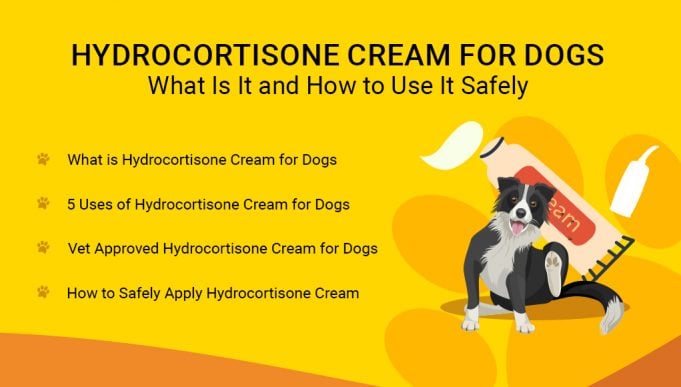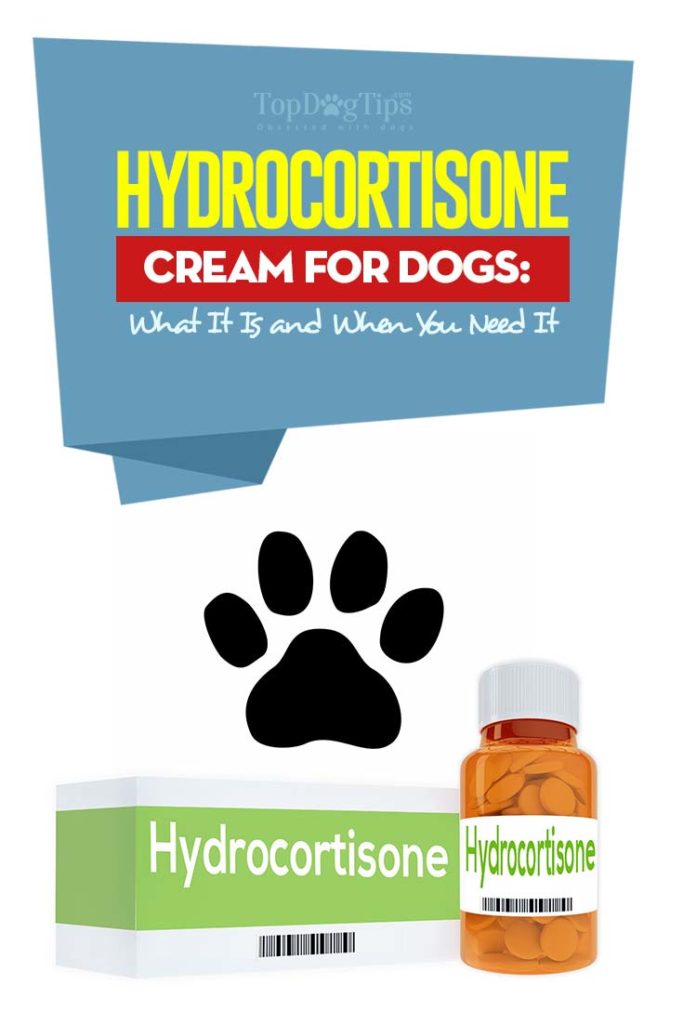Hydrocortisone is a medicinal substance found in many human-grade topical products.
Its main utilization is in treating inflammation or allergic reactions, particularly if they involve skin rash flare-ups.
Recently, hydrocortisone is becoming used in veterinary products, and one of the more commonly bought items is hydrocortisone cream for dogs.
Glucocorticoids were the most commonly used type of treatment for various dog skin conditions (1).
However, after recent studies discovered their lack of skin penetration and potential side effects for dogs, making the risk-to-reward ratio not worth it, veterinary dermatologists stopped using them.
They did not recommend them any longer (2, 3).
Companies developed new and better products thanks to esterification to a hydrocortisone template molecule, and studies showed them to be effective and safer for dogs (4, 5, 6, 7).
This ‘hydrocortisone for dogs' products include creams and sprays, and companies tested them for efficacy on several canine skin problems, including dermatitis, allergies, pruritus, and more.
In particular, a large 2012 study focused on testing the safety and efficacy of hydrocortisone for dogs found it to be without adverse effects.
The majority of dogs achieved a 50% or more reduction in skin inflammation and related skin problems.
Scientists also found that hydrocortisone also improved barrier skin function in tested dogs.
What is Hydrocortisone Cream for Dogs?
Hydrocortisone will often contain high concentrations of corticosteroids (8).
Corticosteroids are a type of hormone steroid, and studies showed their topical use to be effective at treating irritating, itchy, inflamed, and dry skin in dogs.
Corticosteroids come in two forms: hormones that can be naturally found in a dog's body (mineralocorticoids).
They manufactured synthetic products common in veterinary medicines (glucocorticoids), such as discussed hydrocortisone cream for dogs.
Hydrocortisone products made for people are not recommended for dogs.
There's a difference between your hydrocortisone topical and dog-friendly hydrocortisone cream.
Human-grade hydrocortisone is not FDA-approved for animals and is not vet recommended to treat dog skin problems.
While hydrocortisone creams in your medicine cabinet could, in fact, treat an itchy area, rash, or hot spot on your dog’s skin, if the dog were to lick that cream, adverse side effects could occur like weakened bladder, diarrhea, vomiting, and dehydration (9, 10).
Luckily for you and your pet, there are multiple hydrocortisone creams for dogs, as well as hydrocortisone lotions, sprays, oral medications, and even medicated shampoos containing hydrocortisone specifically designed for a canine patient.
They are often used (and, sadly, misused) in veterinary dermatology.
However, when following safety instructions, they are extremely effective for treating several skin issues in dogs.
5 Uses of Hydrocortisone Cream for Dogs
Hydrocortisone is a powerful substance observed in studies to treat skin conditions in dogs successfully, and it's been used in animals at least since the 70s (11).
Below are five of the most common conditions where hydrocortisone for dogs is used.
1. Atopic Dermatitis
Atopic dermatitis is a veterinarian term used to explain a chronic skin issue linked to a dog's allergic reaction.
Any of the following are likely to be recommended and prescribed by your vet to combat this skin problem: antihistamines, cyclosporine, and corticosteroids like hydrocortisone cream for dogs (12).
These can be oral or topical prescription products.
Topicals will be directly applied to the inflamed skin.
Several studies found that hydrocortisone is safe and can significantly improve atopic dermatitis conditions in dogs (13, 14).
2. Other Canine Allergies
Dogs may experience occasional allergic reactions.
You’ll know your dog is suffering from allergies if they exhibit any of the following signs:
- runny nose
- excessive sneezing
- biting and licking their paws
- rash development
- itchy skin
- lethargy
While a vet best looks at a chronic allergy in dogs, non-threatening allergies – many of which are present seasonally – can be treated with hydrocortisone cream for dogs and other hydrocortisone products, such as flea allergy dermatitis (15).
However, it’s important to note that hydrocortisone will not treat allergies at its core.
The effect of hydrocortisone use is merely easing any potential inflammation or itchiness found on your pet’s skin.
3. Hot Spots
A “Hot Spot” is a term used to describe a localized lesion that a dog has licked or scratched into a severely inflamed and infected area of skin.
Other names for hot spots include moist dermatitis or pyotraumatic dermatitis.
Hot spots can occur secondary to a dog exacerbating common dog ailments, such as pest bites (insects, mites, ticks, fleas), allergies, or non-serious injuries, such as minor cuts or scratches.
Hot spots can also be seen in dogs with a history of allergies that tend to lick and chew their paws or their body more than others.
Hot spots often develop very quickly, and without treatment, the dog will create a severely ulcerated and painful problem.
Severe hot spots will need to be treated by your veterinarian as they often require injectable steroids and sometimes oral antibiotics.
One of the most important parts of treatment for a hot spot is a barrier between your dog's mouth and the lesion, typically using an Elizabethan collar.
For mild hot spots, you may try treating them with E-collar and topical steroid sprays, but without a barrier in place, the dog will just continue to lick the medication and worsen the problem.
4. Poison Oak, Ivy, Sumac
Rashes from toxic plants like poison oak or poison ivy typically subside within less than a month.
However, the presence of itching can lengthen this ailment and cause it to become inflamed and possibly lead to more serious infections in dogs (19).
Hydrocortisone cream for dogs is an effective medicine for specifically these issues.
It doesn’t intend to treat but merely ease discomfort in the pet, reducing or eliminating itching and allowing for a quicker recovery (20).
Vet Approved Hydrocortisone Cream for Dogs
While you can use hydrocortisone products designed for people technically on dogs, we currently have no studies on the proper and safe dosage for dogs.
However, Food and Drug Administration does have some recommendations for hydrocortisone spray uses.
The FDA approves Dog-friendly hydrocortisone products.
They are safe to use, especially when treating a rudimentary skin issue like a tiny rash without the need for guidance from a veterinarian.
Note: You should only do this if the inflamed skin is not paired with additional symptoms.
Below are a few well-known brands and products available over-the-counter for pet owners to consider if you want to try hydrocortisone for your dog's skin problem.
1. Zymox Topical Spray with Hydrocortisone for Dogs (1%)
Find it on Amazon | Find it on Chewy
Zymox is the best-known brand among pet owners and veterinarians.
The company makes several products designed to ease skin inflammation and itchiness, including dog shampoos supplemented with hydrocortisone and various skin infection and ear infection treatments.
The company used to have the largest library of studies of testing their products, but with their site's rebranding, they have since removed it.
The Zymox hydrocortisone topical spray is also a disinfectant, so there’s no need to wash and dab-dry the area before applying.
Additionally, it fights infection by protecting the immune system against bacteria and is safe if your dog licks the medicated area.
2. Remedy & Recovery Hydrocortisone Lotion for Dogs (0.5%)
When applied directly to the skin after a soothing bath or gentle rinsing of the inflamed area, the Remedy & Recovery, low-dose hydrocortisone cream for dogs, helps reduce redness and inflammation, hydrates the skin, and eases irritation in dogs.
Due to its lower dosage of hydrocortisone itself, this may be an ideal addition to a monthly dog grooming routine.
3. Veterinary Formula Clinical Care Itch Relief Spray for Dogs
Find it on Amazon | Find it on Chewy
A well-known brand makes another trendy hydrocortisone spray for dogs, Veterinary Formula Clinical Care.
This is a dye-free anti-inflammatory spray meant to be used for minor skin ailments in dogs and is most commonly used by dog owners for itch relief and hot spots.
You can also use it to heal wounds on dogs, reduce swelling and redness, and insect bites.
For hot spots, dermatitis, and similar skin problems, it's recommended to use this alongside their antiseptic shampoo and itch supplements.
4. Veterinarian-prescribed oral medications
For pet skin issues that do not resolve within one to two weeks of utilizing ‘hydrocortisone cream for dogs products or for severe hot spots, contact your pet’s veterinarian for an appointment.
Be as specific as possible during the appointment when the vet and staff ask questions, as these may help them deduce the underlying issue and pick the best solution and treatment.
Your vet will likely suggest prescribed medications containing cortisol.
These medications fight infection, reduce redness and swelling in dogs, and help with pain management, guiding the dog through the healing process more quickly and efficiently than hydrocortisone cream for dogs or other over-the-counter hydrocortisone ointments or soaps.
How to Safely Apply Hydrocortisone Cream
Here are a few tips and items to consider when treating rash, infections, inflamed skin, and other related issues on your dog at home with the use of hydrocortisone cream for dogs or other hydrocortisone treatments:
1. Get a recovery cone/collar
Every dog owner should use an inflatable collar or an Elizabethan collar (often referred to as a head cone or recovery cone) in case infection strikes.
It’s a handy household item for the modern pet owner, although your dog isn’t likely to appreciate it.
These devices come in various sizes and materials – some plastic, some foam – to ensure a proper fit and comfort for the animal.
They will keep your dog from licking or chewing on parts of its body that causes it to be vulnerable to infection.
It’s also relevant to use hydrocortisone cream for dogs to treat hot spots or dry skin, as it will keep them from licking at the area.
2. Check for open wounds
When the skin becomes inflamed, itching naturally follows.
Some dogs may even stress over the dry, itchy skin, pawing and biting at it incessantly, which can cause the skin to break and open wounds.
Note: Cortisone is not recommended for use on or near an open wound.
Always check the rash for any signs of open skin before application and contact your vet should any bleeding occur.
3. Ask for help
It’s likely the raised, red area of skin is causing your dog discomfort, which is why it may be ideal or even necessary for you to request help from a housemate or neighbor when applying hydrocortisone cream for dogs or other similar ointments.
The two of you, when working together, can ensure the dog is calmer as you apply medicine to its skin.
Avoid holding the dog forcibly down, which could cause them more distress.
Instead, have one person pet the dog and speak to them in a soothing voice while the other works quickly yet gently to spread or dab the cream over the affected region.
4. Wash hands before application
To help fight off the risk of infection and further complications, always thoroughly wash your hands before touching or inspecting your dog’s inflamed skin, and of course, wash them off completely afterward, too.
5. Use a cotton-tip applicator
You may want to use a cotton swab, apply the cream to one end, and gently spread it around the rash.
This is another method intended to safeguard from the potential of infection and is simply the easiest way to apply the ointment.
6. Keep the inflamed skin clean
Any time animal experiences dry, irritated skin, they will lick, itch, and even bite at it in an attempt to soothe or “heal” the area.
Unbeknownst to them, this attention worsens swelling, spreads the rash, and increases their chances of infection, which is why it’s important to routinely wash the area, particularly before applying hydrocortisone cream for dogs or any other topical solutions.
Hydrocortisone Cream for Dogs: FAQs
Will hydrocortisone hurt my dog?
Hydrocortisone cream will not hurt your dog if you use the version engineered for use on animals. You should not use the versions for humans on your dog.
Once the cream dries, you do not have to worry as much about your dog licking it. The worst that is likely to happen if he licks dry hydrocortisone cream is some foaming or drooling.
Can you use hydrocortisone on dogs’ hot spots?
Yes, hydrocortisone cream works well on dogs’ hot spots. Just make sure to use a product for dogs and follow the instructions on the tube.
What are human creams safe for dogs?
Only certain human creams are safe for dogs. When in doubt, it’s always best to ask your vet before using any human cream.
That said, Pepcid AC, Claritin, Zyrtec, Benadryl, Artificial Tears, and Neosporin are typically safe for dogs.
What can I put on my dog to stop itching?
Hydrocortisone cream can help with itching, as can a spray with equal proportions of water and apple cider vinegar.
If your dog has a lot of itching, you should consult your vet.
What happens if my dog licks hydrocortisone cream?
If your dog licked and ingested hydrocortisone cream, he may experience increased thirst and urination, vomiting, panting, and diarrhea.
Hydrocortisone Cream for Dogs: Before You Go
Hydrocortisone for dogs is safe when following a few safety guidelines.
As long as they are used sparingly on the skin, most over-the-counter hydrocortisone creams are safe for dogs.
This kind of ointment is excellent for dogs when used to treat minor skin inflammation and edema.
Just make sure you're using it no more than twice each day.
Reach out to your vet for a prescription strength choice if your woofer is still itchy in between doses.
READ NEXT:
- Top 7 Best Dog Foods for Itchy Skin
- 9 Common Dog Skin Problems (How to Prevent and Treat Them)
- 6 Home Remedies for Dog Skin Allergies
Disclosure: We may earn affiliate commissions at no cost to you from the links on this page. This did not affect our assessment of products. Read more here and find full disclosure here.














